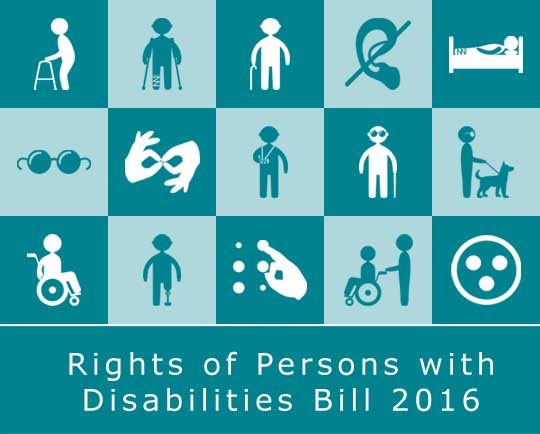
Types of Disabilities
- Types of disabilities increased from existing 7 to 21
- Disability defined based on evolving and dynamic concept
- Central govt will have power to add more types of disabilities
Education
- Right to free education for children with disabilities of 6-18 years
- Educational institutions funded / recognized by Govt will have to provide inclusive education to children with disabilities
- Reservation in higher education and Government jobs
- Section 32 [2] stipulates upper age relaxation of five years for admission for students with
benchmark disabilities.
Accessibility
- Stress on accessibility in public buildings ( both Govt & Private)
Employment
- Reservation in vacancies increased from 3% to 4%
Security
- Section 37 provides for five per cent reservation in allotment of agricultural land and housing in all relevant schemes and development programmes.
- The bill provides for grant of guardinship by District Courrt
Penalties for Offences committed against PwDs - Special Courts in each district for cases concerning to vilolation of rights of PwDs
Administration
- Office of CCPD / SCPD have been strengthened.
- Formation of District level committees.
Funds
- Creation of National and State fund to provide financial support ot PwDs
Chapter by Chapter
- Chapter 1 is Preliminary. It contains short title and provision regarding commencement of the Act.
- Chapter 2 is on Rights and Entitlements. It comprises a whole range of provisions including provisions in respect of equality and non-discrimination, women and children with disabilities, community life, protection from cruelty and inhuman treatment, protection from abuse, violence and exploitation, home and family, reproductive rights, accessibility in voting, access to justice, legal capacity, and provision for guardianship where and to the extent needed, designation of authorities to support, etc.
- Chapter 3 is on Education. It envisages duty of educational institutions, measures to promote and facilitate inclusive education and adult education.
- Chapter 4 is on Skill development and employment. It comprises a comprehensive gamut of provisions which includes provisions relating to vocational training and self-employment, non- discrimination in employment, appointment of grievance redressal officer, institutionalization of equal opportunity policy, etc.
- Chapter 5 is on Social Security, health, rehabilitation, and recreation. Provisions include those on social security, healthcare, rehabilitation, research and development, culture and recreation, and sporting activities, etc.
- Chapter 6 is on Special provisions for persons with benchmark disabilities which is referred to in the subsequent segment, namely, part five of this narrative.
- Chapter 7 is about Special provisions for persons with disabilities with high support needs which is also referred to in the subsequent segment, part five of this narrative.
- Chapter 8 is on Duties and Responsibilities of Appropriate Governments. These duties and responsibilities are essentially around awareness-raising about rights of persons with disabilities, and also around their accessibility of infrastructure, transport, information and communication, consumer goods, mandatory observance of accessibility norms and compliance with time-limit therefore, etc. These are further referred to in part seven as the private sector is an important player and partner in ensuring accessibility. This chapter also stipulates provisions in respect of human resource development and social audit to be undertaken from time to time.
- Chapter 9 is on Registration of Institutions for Persons with Disabilities and Grants to such Institutions.
- Chapter 10 is on Certification of Specified Disabilities.
- Chapter 11 is on Central and State Advisory Boards on disability and District Level Committee.
- Chapter 12 is about Chief Commissioner and State Commissioner for Persons with Disabilities. This is referred to at some length in part six of the narrative.
- Chapter 13 is on Special Court. This too is referred to in part six.
- Chapter 14 is on National Fund for Persons with Disabilities.
- Chapter 15 is on State Fund for Persons with Disabilities.
- Chapter 16 is regarding offences and penalties briefly alluded to in part two of this narrative.
- Chapter 17 is Miscellaneous. It confers powers to frame rules under this Act both on the central as well as the state Governments and contains usual provisions in respect of repeal and savings, etc.
Ref: NASSCOM and Disability affairs